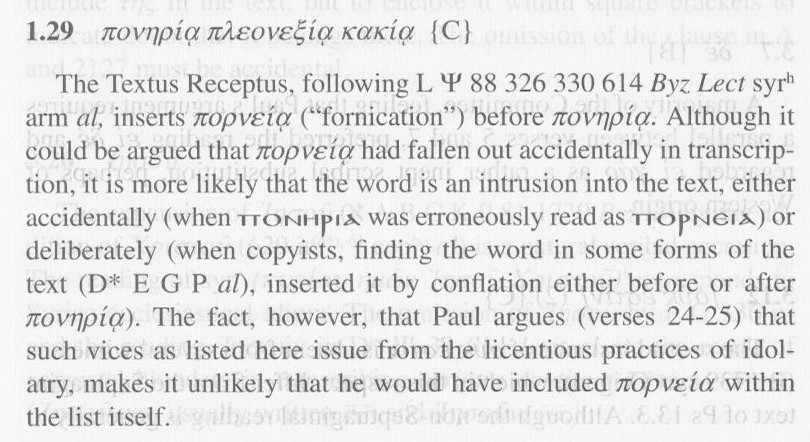Rom 1:29 has several sets of variations among the MSS, mostly involving the order of the three words, πονηρίᾳ πλεονεξίᾳ κακίᾳ. However, the OP asks specifically about the Byzantine texts which includes an extra word, πορνείᾳ, in this list whose position also varies.
- Of the edited GNT's that omit πορνείᾳ include: NA28/UBS5, SBL, W&H, Tischendorf, THGNT, NIVGNT.
- Of the edited GNT's, the include πορνείᾳ include: R-P Byzantine text (2005), F35, TR, Orthodox Patriarchal text, Majority Text.
Amongst the original MSS, those that omit πορνείᾳ include (century dates in brackets) from UBS5:
- 01(IV), 03(IV), 02(V), 04(V), 0172(V), 018(IX), 33(IX), 1739(X), 424(XI, as corrected)), 81(XI), 6(XIII), 1881(XIV), 1506(XIV), plus lectionaries and church fathers.
Amongst the original MSS, those that include πορνείᾳ include (century dates in brackets) from UBS5:
- 05(as amended later), 019(VIII), 011(IX), 44(IX), 2464(IX), 1175(X), 1912(X), 104(XI), 459(XI), 256(XI), 424(XI, original), 436(XI), 1962(XI), 365(XII), 1241(XII), 1319(XII), 2127(XII), 1573(XII), 1582(XIII), 263(XIII), 2200(XIV), plus lectionaries and church fathers.
It is immediately clear that the earliest MSS omit πορνείᾳ and the majority of later MSS include it. Hence the distinction in the edited GNT's above.
Bruce Metzger in his Textual Commentary on the GNT opines as follows:

The simple reason that NT lexicons, such as Friberg, Gingrich nor Danker do not list πορνείᾳ in Rom 1:29 is that they are based on NA28/UBS5 which omits the word in Rom 1:29. However, my 3rd edition of BDAG lists it as a variant reading.
